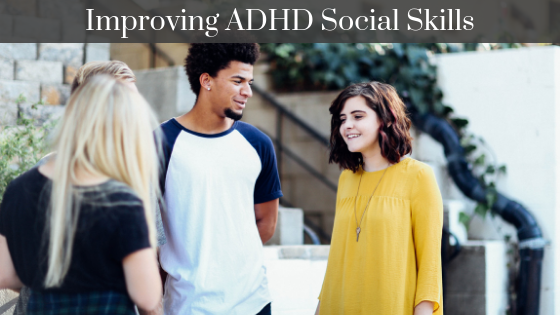Many ADHD children struggle to make & keep friends. The exact reason for this is not understood but experts believe it could be due to the impulsiveness, hyperactivity, and inattention associated with ADHD. For example, a more inattentive child may seem shy or withdrawn to their peers. Whereas, a child who is impulsive or hyper may be rejected by their peers because they may be intrusive. If you notice your child is struggling in their relationships, the good news is research shows social skills can be taught.
How can you work towards helping an ADHD child to improve their social skills?
Help them spot the issue- If your child is having a hard time socially chances are they will not be able to notice it themselves. Pay attention to how the child gets along with other kids. Once you’re able to tell that there is an issue, you can then start working with them to help. Sometimes it can be challenging to see if there’s an issue and understand why it is happening. The best way to handle this is to involve a professional who specializes in ADHD testing. They can assess what the problem is and work with you on a plan tailored to your child’s needs.
Help them to be more aware- Since your child may not be able to understand how their social behavior affects others, work with them to make them more aware. For example, if you notice your child had a bad interaction with a peer, ask them about how they thought it went. If you find they thought it went well but in fact, it did not explain to them why. In these situations, you should work to teach your child how to read a social situation, self-evaluate what happened, self-monitor and adjust their behavior as needed.
Help them by role-playing- You may not always be present to see your child’s interactions with others. If you suspect they are having trouble socially, practice social skills through role-playing with them. Make up “real life” scenarios and act them out with them. Afterward, ask them their thoughts and use this time to give them feedback to help them learn what positive interactions look like. It may work best if you focus on one or two things that your child is struggling with, so they will not feel overwhelmed. For example, maybe your child struggles with learning to take turns. You could work with them to show them what it looks like and why it is important. Be sure to reward them with positive affirmations as you see improvement along the way.
Help them by facilitating social activities- Since many children with ADHD also struggle with time management and follow-through, it may be helpful to set up playtimes or if the child is older remind them of their social schedules. Help your child to choose activities that are in line with their interests. If your child is interested in sports, let them join an extracurricular activity. Going to weekly practices and interacting with their peers may help them with time management as well as developing a routine where social interaction is consistent.
Help them by collaborating with their school & other leaders- Be sure to be in communication with all who work with your child. Collaborate with one another to share strategies that have worked in the areas your child is working on. For example, If your child is struggling in school, they need to receive the affirmation and help they need from their teachers. This may help them to feel more confident in the classroom as well as around their peers. Not to mention you need a support team to help as you and your child navigate through their challenges.
Keep in mind if your ADHD child is having trouble socially, chances are the issues will not go away overnight. As you work to understand what the issues are and work with them, over time you may see some improvement. Be sure to celebrate those accomplishments along the way and know that you are not alone. If you have any questions or need some additional support, please let us know. Also, be sure to check out our blog and resources page for more helpful information.

